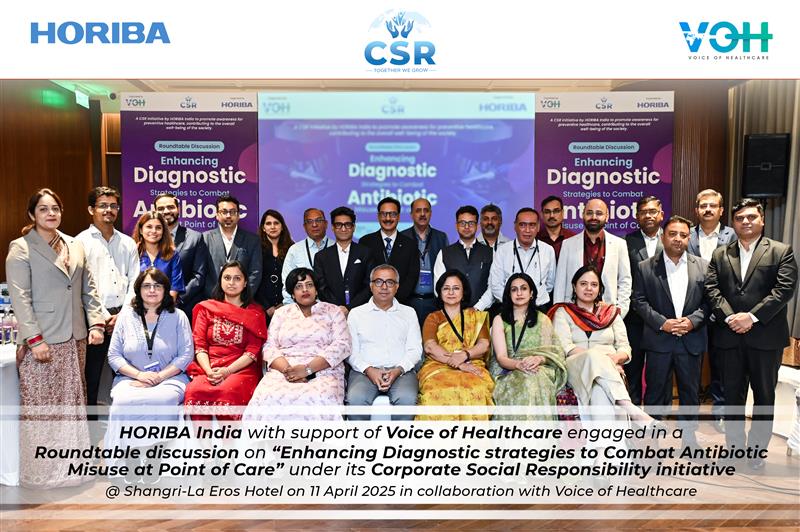
Trust the Test, Not Just the Treatment: Experts Call for Science-Backed Diagnostics to Tackle India’s AMR Crisis
As antimicrobial resistance (AMR) silently grows into one of the world’s biggest health threats—second only to climate change—India is facing an urgent wake-up call. And at a recent high-powered roundtable, top health experts, policymakers, microbiologists, and diagnostics specialists gathered in New Delhi to send one strong message: If we don’t improve how we test, we’ll keep getting treatment wrong.
Held under the banner of Voice of Healthcare and supported by HORIBA India as part of its healthcare CSR mission, the roundtable zoomed in on the urgent need for diagnostic stewardship—a smarter, more evidence-based approach to testing before prescribing antibiotics.
“AMR is creeping in silently. We can’t afford to wait.” Opening the event, Dr. Naveen Nishchal, Founder Chairman of Voice of Healthcare, didn’t mince words. “AMR today stands as the second-biggest global health threat after climate change,” he said. Reflecting on India’s international image when it comes to hospital-acquired infections and antibiotic misuse, Dr. Nishchal urged immediate action: “Diagnostics and point-of-care testing can transform how we deal with this crisis. Everyone in this room has the power to make that change happen.”
Not just technology — it’s about shared responsibility Taking the industry’s perspective, Dr. Rajeev Gautam, Senior Corporate Officer of HORIBA Ltd. Japan and President of HORIBA India, reminded the audience that this wasn’t just another tech talk. “This isn’t a platform to show off instruments. It’s about building awareness and sparking collaboration,” he said.
HORIBA, known globally for its diagnostics and life sciences work, backed the event as part of its effort to promote preventive healthcare and shared responsibility. “We must act before patients land in the ICU” Dr. Ravi Gaur, who chaired the roundtable and is a leading voice in diagnostics, laid out the ground reality.
“AMR is a silent pandemic. It doesn’t hit with a bang—it builds up quietly until the antibiotics we depend on stop working,” he said. As Chairman of the Medical Advisory Committee at Oncquest Laboratories and founder of DRG Path Labs, he warned that waiting until a patient is critically ill is already too late.
“Around 52% of antibiotics in India are sold without prescription,” he pointed out. “We must bring diagnostic testing into pharmacies, clinics, and even homes—because that's where the first decision about medicine happens.” Government steps up: “The wrong test leads to the wrong prescription” Speaking on behalf of the government, Dr. Lata Kapoor from the Ministry of Health and Family Welfare emphasized that AMR has now reached the level of a “silent pandemic.”
She confirmed that irrational antibiotic use is widespread, especially in ICUs and emergency rooms where doctors often prescribe based on guesswork, not lab results. “The government is committed to changing this,” she said. “Point-of-care tests need to be part of our national AMR strategy. The right test at the right time can stop the wrong medicine from being given.”
A roundtable of solutions — not just discussion The event moved into two focused sessions: one to understand India’s AMR landscape, and another to brainstorm real-world solutions. The room was filled with brilliant minds from across the healthcare spectrum — including Dr. Arjun Dang (CEO, Dr. Dangs Lab), Dr. Ankur Mutreja (PATH), Dr. Vikas Manchanda (Maulana Azad Medical College), and Dr. Aakashneel Bhattacharya (Paras Hospitals), among many others.
From microbiologists and ICU specialists to public health leaders, everyone agreed: diagnostics must become central to how India fights AMR. It’s not enough to talk about the problem — it’s time to test smarter, prescribe wiser, and bring all stakeholders together in this shared mission.